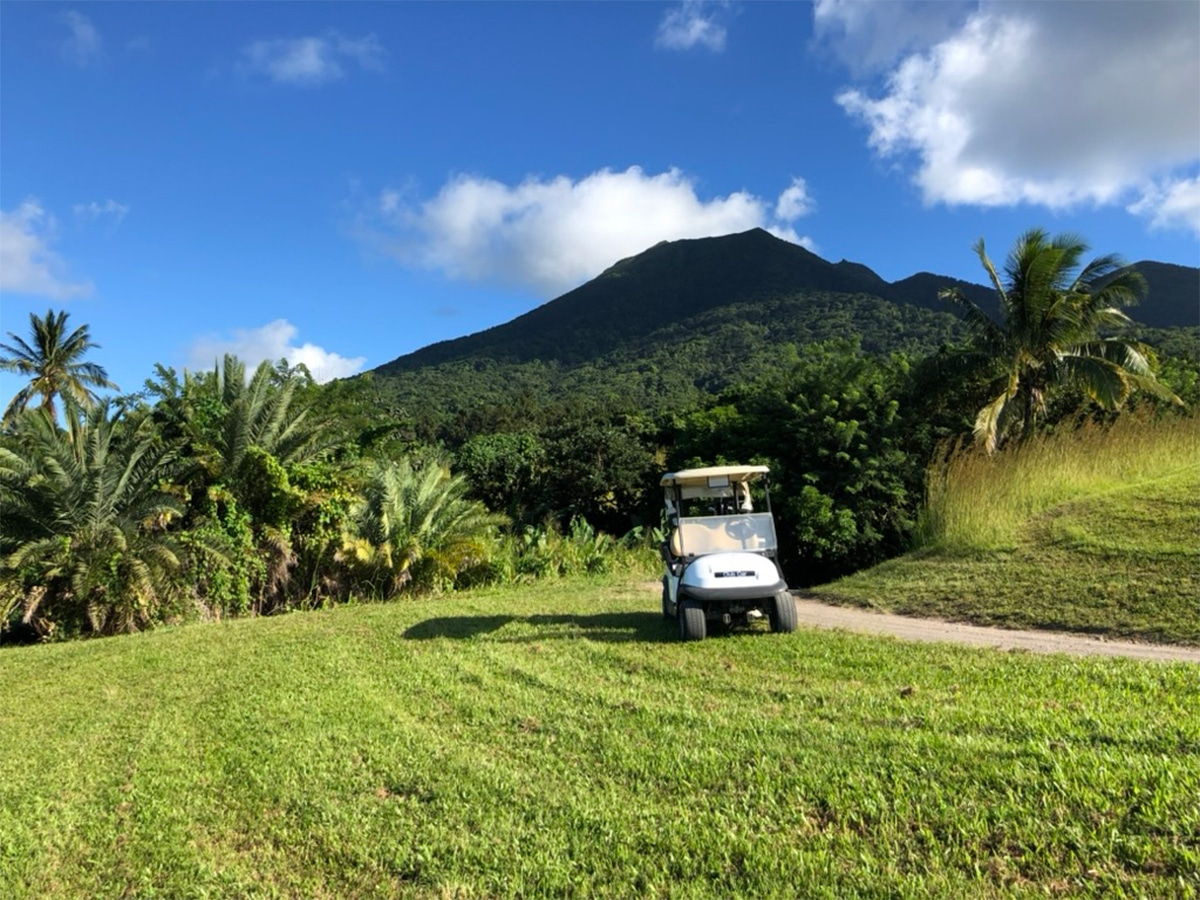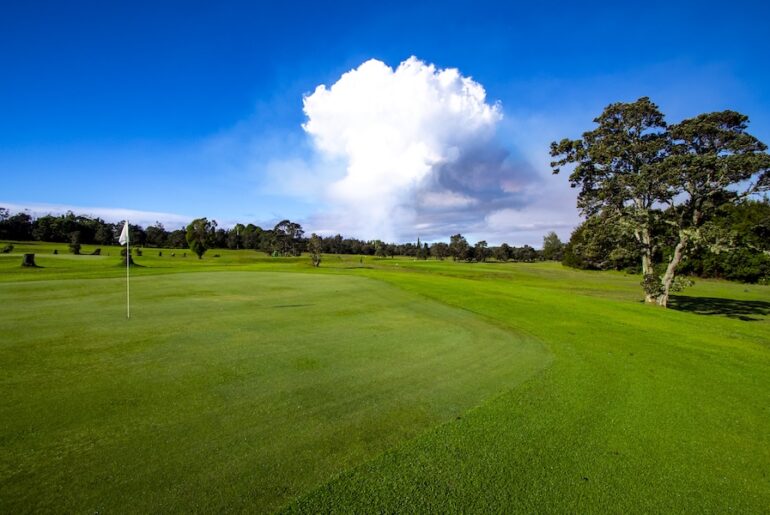The golf cart business in the Caribbean has undergone a quiet transformation over the past decade, evolving from a niche product for golfers into a core transportation and operations tool for resorts, residential communities, and even entire islands. Once dominated by gas-powered and lead-acid battery models, the market is now shifting decisively toward fully electric carts powered by advanced lithium technology — a change driven by lower maintenance demands, faster charging times, and significant long-term cost savings.
This evolution has been shaped by a combination of practical needs and shifting expectations from both operators and guests. In destinations where logistics can be challenging and support networks are spread across islands, the reliability of premium, U.S.-built carts and the ability to deliver parts quickly have become as important as performance and design. Today, in many Caribbean communities — from Ambergris Caye in Belize to Harbour Island in the Bahamas — golf carts are no longer an amenity; they’re the default mode of transport and an integral part of daily life. One company has leading the charge: Tropicars, which has been at the forefront of the region’s golf car boom.
Can you give us an overview of the evolution of today’s Golf Cart industry?
The golf cart industry in the Caribbean has evolved dramatically over the past decade and it’s not just about golf anymore.
One of the biggest shifts we’ve seen is the move away from gas-powered and lead-acid battery carts to fully electric models using advanced lithium technology. Resorts and golf courses across the region are realizing that the long-term cost savings are too big to ignore. With lithium, there’s no regular battery maintenance, no messy watering, and no engine servicing like with gas. Plus, many clients are seeing their electricity bills drop by nearly 50% after switching from lead-acid to lithium that adds up fast when you’re running a large fleet.
At Tropicars, we’ve leaned into this shift by representing brands like EZGO, which uses premium Samsung SDI lithium battery systems backed by an 8-year battery warranty — the best in the business. This kind of reliability and low-maintenance design is exactly what our Caribbean clients need, especially on remote islands where support isn’t always around the corner.
The result? Carts have gone from being a luxury to being an essential part of how resorts operate and how guests experience the Caribbean.
Can you tell us a little about Tropicars and who are your typical clients?
We have been the Caribbean’s go-to distributor for premium golf and utility vehicles for the past 15 years. We’re the exclusive regional distributor for EZGO, CUSHMAN, and POLARIS brands known for their reliability, innovation, and performance in tough environments.
What sets us apart is the legacy we’re built on. Tropicars is part of a larger aviation-focused group that includes Africair and TAD, companies that have been operating for over 57 years as distributors for Cessna, Beechcraft, and Bell Helicopters in both Africa and the Caribbean. That aviation DNA brings a whole new level of professionalism, logistics expertise, and after-sales support to everything we do.
Our core business is centered around golf courses and hotel resorts. We proudly serve world-renowned names like Sandals and Four Seasons, and we supply the majority of the region’s top golf courses. In Jamaica alone, we provide vehicles to every golf course on the island, except for one.
Where are the best carts made? How do you transport carts to the Caribbean?
The best carts in the world are made right here in the USA and that matters, especially for the Caribbean. It’s not just about build quality, which is unmatched, but about after-sales support, time zone alignment, and reliable access to parts.
We’ve seen plenty of resorts and properties try to cut corners with Chinese-manufactured carts to save upfront, only to realize later that it costs them more in the long run. When something breaks, it’s a hassle parts can take a month to arrive if available, and importing small orders from overseas quickly becomes expensive. Not to mention, you’re often left without any real support.
By working with U.S. brands like EZGO, we make life easier for Caribbean resorts. All of our parts are stocked in Miami, and when you need something, it’s on-island in about a week not a month. That speed means our clients don’t have to sit on large inventories of spare parts. We carry that weight for them.
As for shipping, every order leaves from Miami, and we work with a wide network of freight forwarders who specialize in exports to the Caribbean. Most of our clients already have preferred freight partners, but when needed, we’re happy to recommend the best options for the destination and cargo type.
How important are carts to the Caribbean? Which islands?
Golf carts are absolutely vital across the Caribbean both for business and personal life. Resorts and golf courses may be the most obvious users, but the role of golf cars extends far beyond that. In many upscale residential communities and private villas especially those built within resort footprints homeowners rely on carts daily for errands, family outings, and even shuttle services across large properties. It makes sense. On sprawling resort grounds or gated residential enclaves, carts are easier, cleaner, and more fun than using a full-size car for short trips.
Across islands like Ambergris Caye in Belize, golf carts are the de facto mode of transport. In San Pedro town, tourists and residents move almost exclusively via carts, because cars aren’t permitted outside government, taxi, or delivery use. On Harbour Island in the Bahamas, golf cars are used by locals and visitors alike they’ve even become part of the island’s charm and lifestyle.
In Jamaica, Dominican Republic, Puerto Rico (including communities like Casa de Campo and Palmas del Mar), and Grand Turk, carts are an integral part of daily operations at resorts. They shuttle guests, deliver supplies, and support maintenance and housekeeping teams often weaving through beaches, villas, golf courses, and marinas seamlessly.
For homeowners living in and around these resorts, owning a cart is almost a necessity. These communities are often designed with narrow streets and pedestrian-friendly layouts, making golf carts more convenient and eco‑friendly than conventional vehicle.
In short, golf carts in the Caribbean are not a luxury they’re a core part of the lifestyle and the day‑to‑day functioning of resorts and residential communities alike.
How do you service carts in the Caribbean?
Service and support are at the core of what we offer, especially in a region where downtime can mean lost revenue for resorts and golf courses. That’s why we invest heavily in building a strong support network across the Caribbean.
Twice a year, we host EZGO Service Training Schools on different islands, where we fly in certified EZGO engineers to lead an intensive three-day program. These classes are completely free for our customers, and techs who complete the training earn the prestigious Gold Certified Technician status. We invite technicians from resorts and service companies across the region so they can get hands-on training and be equipped to support fleets locally.
We also have on-island service representation in Jamaica and Curaçao, with more locations being added. In islands where we don’t yet have permanent staff, we work with a trusted network of trained technicians who have been through our certification program and are ready to step in when needed.
All parts are stocked in our Miami facility, giving us the ability to ship quickly to anywhere in the Caribbean. In urgent cases, we can get parts to an island within a few days, minimizing downtime.
In addition, we offer remote troubleshooting, live WhatsApp service group chats, and full warranty processing support, so help is never more than a message away. Whether it’s in-person or remote, we make sure our customers always have someone to turn to when they need assistance.
Is there a big market for 2nd hand carts?
The second-hand cart market in the Caribbean isn’t as active today as it was during the COVID period, when long lead times for new vehicles created a spike in demand. That said, there’s still a niche for certified pre-owned options especially for golf courses or smaller resorts looking for more budget-friendly solutions without compromising on quality or support.
At Tropicars, we occasionally buy back resort fleets, bring them back to our Miami facility, and refurbish them for resale. We also offer factory-certified pre-owned carts that come directly from the manufacturer, many of which still include limited warranties for added peace of mind.
While the majority of our clients still prefer to purchase new carts to take full advantage of the manufacturer warranties and the latest technology, we understand that some properties need flexibility. That’s why we offer a range of options to fit different budgets without sacrificing reliability or support.
Obviously big resorts and golf courses use carts but how else are they used?
Carts are used in a lot more ways than just shuttling golfers or resort guests. Across the Caribbean, they’ve become a go-to solution for maintenance teams, housekeeping, landscaping crews, security patrols, and marina operations. Their compact size, quiet operation, and versatility make them ideal for navigating large properties without disturbing guests or damaging landscaped areas.
In many private communities, especially those built within or around resorts, carts have also become a favorite for personal transportation. Families use them to drop kids off at the pool, run errands, or head to the beach. In places where full-size vehicles are overkill or simply not allowed — carts have become part of the everyday lifestyle.
We’re also seeing an increase in creative uses. Event venues use them for vendor logistics, airports for internal transport, and construction sites for crew movement. The applications are growing every year, especially as carts become more customizable with accessories like cargo boxes, lighting, and enclosures.
Are there islands where no cars are allowed and they only use carts?
Yes, several destinations in the Caribbean are either officially car-free or have naturally adopted golf carts as the primary form of transportation.
One standout is Ambergris Caye in Belize, specifically San Pedro. The narrow roads and limited parking make golf cars the main mode of transport for locals and visitors. Nearby Caye Caulker is even more restrictive cars aren’t allowed at all, and the island relies entirely on golf carts and bicycles.
In the Bahamas, Harbour Island is famously cart-friendly, with almost everyone using golf cars to get around. Green Turtle Cay is another example where, although cars are technically allowed, golf carts dominate daily movement.
Private islands like Chub Cay also favor carts due to their small size, limited infrastructure, and resort-style living. Historically, even resorts like Frenchman’s Cove in Jamaica used to offer guests electric carts instead of cars, enhancing the sense of luxury and exclusivity.
How has technology enhanced the experience of owning a cart?
Technology has completely transformed the golf cart experience, especially in the Caribbean where efficiency and reliability are key.
The biggest game changer has been the shift to lithium battery systems. They’re lighter, more efficient, charge faster, and require virtually zero maintenance. Golf Cars now go farther on a single charge and perform better on hills and longer routes all without the constant upkeep that came with lead-acid batteries. Plus, with brands like EZGO using Samsung SDI lithium batteries, you get the best of the best with warranties up to eight years.
We’ve also seen advancements in smart chargers and regenerative braking, which help preserve battery life and reduce energy costs for resorts and property owners.
On the accessory side, carts today can be outfitted with custom lighting, built-in GPS, coolers, touchscreen displays, and even solar charging options. This makes them more than just a ride they become a fully functional tool or luxury amenity depending on the need.
What do you see for the future of carts in the Caribbean and industry-wide?
The future of golf cars in the Caribbean is all-electric, smarter, and more essential than ever.
Resorts and communities are moving away from gas and lead-acid models in favor of lithium-powered electric cars. They’re more efficient, easier to maintain, and better for the environment a win-win for both operations and guest experience.
We’re also seeing golf cars evolve into lifestyle vehicles. With custom designs, smart features, and branding options, they’re becoming an extension of a resort’s image or a homeowner’s personality.
Technology like GPS tracking, remote diagnostics, and fleet management tools will continue to grow, helping resorts improve service and reduce downtime. And with faster parts delivery and better regional support, the Caribbean is leading the way in modern golf car adoption.
As tourism grows, golf cars will remain a key part of daily life not just for convenience, but as a strategic asset.







